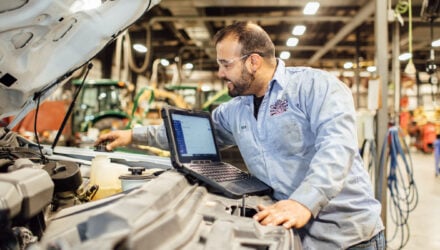
DECISION: EVs suit fleet needs
In our latest Expert Blog, Alexandra Prescott, Operations Director at Charge Your Car, gives her view on why fleets should go all-electric…
The primary objective of any fleet manager is to ensure that the assets (the vehicles) are sustainable and available, and failure of one or both of these impacts on the success of the company.
Influential considerations in balancing up sustainable and available are fuel and powertrain technology.
There will also be an element of corporate and social responsibility; the green agenda.
Which is where an electric fleet begins to look like a potential answer – but is it the complete answer or is a greater degree of maturity required?
Electric vehicles have an average range of between 80 and 100miles – giving a drive time of three to four hours in average traffic.
Those organisations that operate vehicles with mileage below 80miles per day would find that a pure electric vehicle fleet would meet their needs on a single overnight charge.
Businesses that switch to electric or plug-in hybrid vehicles have the potential to reduce their fleet fuel costs by 75%.
So, the figures add up and continue to add up if your average range is longer, but there are some practical considerations to take into account to avoid the necessity to return to the depot for a fast or slow charge.
The use of the public infrastructure appears to be the obvious answer – battery level creeps towards low, find your nearest charge station with your smartphone and the solution is just a few miles away.
At this point the ‘what ifs’ start to appear:
What if the vehicle won’t make it?
Franke and Krems (2013) assert that the underutilisation of the range resources observed in electric vehicle trials reflects the adoption of safety strategies (e.g. use of safety range buffers) so inexperienced drivers will look for the security of a charge before an experienced driver.
The inexperienced matures to the experienced and the problem diminishes.
What if the charge equipment is unsuitable for the vehicle?
13amp versus type 2 connector et al.
Certainly, the UK has legacy equipment, implemented before any consensus on standards.
As with any new technology, the marketplace demands standards and manufacturers see the value of co-operation and alliance.
The recently-formed UK Electric Vehicle Supply Equipment Association (UKEVSE) – which represents the interests of charge point providers, charger manufacturers and suppliers of EV charging management systems – is testimony to the need for all interested parties to work together.
What if the charge equipment is in use when the driver arrives?
Can a charge slot be reserved?
Certainly technology is capable of providing this service but reservations is not a scenario that works for standard public chargers, where drivers leave the vehicle for extended periods of time both to suit the time needed to charge and a requirement to park.
However, the rapid chargers do present this option because of their additional features, as they are often in hosted environments where a guardian can deal with any infringements and with payment methodologies that can deter drivers from overstaying their welcome.
Reservations become workable – even more so if integrated in advance with the route planning that is a feature of efficient fleet management.
Charge cards are the new fuel cards.
What if the charge card is not accepted at the chosen charger?
The question of roaming between charge estates has been a subject debated at length by car manufacturers, drivers, power suppliers, charge equipment manufactures to name but a few.
The bottom line is that the need for roaming is dictated by payment methodologies.
Incorporate the payment methodology with the every day use of the credit card and banking system and all things are possible.
It works for petrol, diesel and other commodity purchases.
The ‘what ifs’ are all symptomatic of an immature industry, easily resolved with time and focus releasing the inescapable benefit for businesses that switch to electric or plug-in hybrid vehicles: the potential to reduce their fleet fuel costs by 75%.





















